- Home
- Dave Bowman
Fight to Survive: A Post-Apocalyptic Thriller (After the Outbreak Book 1) Page 3
Fight to Survive: A Post-Apocalyptic Thriller (After the Outbreak Book 1) Read online
Page 3
He would leave tomorrow. But first he had to make some preparations.
He walked to the safe in his bedroom and unlocked it. He took out his Glock 17 and looked it over. He holstered it, and then he grabbed his keys.
His neighborhood was strangely quiet as he drove through it in his Ford truck. Normally there would be people coming and going at this time of day, but he saw no one.
The small gas station near the highway was deserted. There were a couple of stationary cars though – they had crashed into each other. One of the drivers sat slumped over in his seat, dead.
Nick was relieved to find that his credit card still worked, as if nothing had changed. The quiet city street made it clear that everything was different, though. No cars passed, and he only heard the sound of some animal rooting around the trash outside the gas station. He saw a cat jump down from the dumpster and run across the parking lot. At least the virus hadn't killed off all the animals. He wondered how many were left.
As he filled his tank, he noticed another smell behind the usual odor of gasoline. It was the smell of the dead. The city must be full of the virus victims, deteriorating in the heat. Shuddering, he filled his tank, along with a few extra gas cans, and drove off.
Back at his house, Nick did some preliminary things right away. He filled up every container he could with tap water. Then he took a shower, washing the grime of the day off his body.
He sliced up all the steaks they had in the fridge and freezer, and got the thin strips drying in the dehydrator to make beef jerky. Hopefully the power wouldn't go out for a while.
He found some chicken and chopped vegetables in the fridge and made a big stir-fry. He ate two generous helpings of it along with some leftover rice, then two big bowls of ice cream. He was ravenous. Besides, if the power went out soon, there would be no way to keep that food from going bad anyway.
As he ate, he looked at his phone. He'd been trying to reach his parents out in Tyler, Texas all day, but there was no answer. The last time he had talked to his mom was yesterday morning. Her voice was weak, and she told him that both she and his father were ill with the virus. He couldn't leave Kaitlyn to go to them, and his mom understood. They both knew it would be the last time they would speak. She had no news of his brother, Tim.
He called a few of his buddies, some co-workers. He tried his in-laws. No one answered their phones. He decided to stop by Kaitlyn's folks' house on his way out of town tomorrow. He told himself he would just check up on them, but he knew they were already dead.
His phone had received several alerts throughout the day. Most were from the local and state government telling people to remain calm but stay in their houses until the virus was contained.
He looked at his news feed. Two days ago it had been full of people's updates of the health status of family members and asking of the whereabouts of friends. As the days wore on, the tone of the updates became panicked, crazed. People were starting to see what the disease could do, and they were terrified.
That afternoon, there were no posts from his friends at all. Just the same government alerts that had been sent to his phone. He set the phone down and plugged it in to charge.
After his meal, he looked around at the empty house. There was so much to do before he could leave in the morning. His mind raced, thinking of a plan. But before he could tackle the first task, a crippling fatigue overtook him. He could think of nothing more than lying down, and he stumbled into the bedroom where he collapsed in his bed. He told himself he’d just sleep for a few hours, then get to work. Burrowing his face in his wife's pillow, he shut his eyes and fell into an exhausted, dreamless sleep.
5
Jessa Hayward stamped out the small campfire she had made to cook her breakfast of oatmeal and coffee. The remains of the pinyon pine smoldered, leaving its fragrant smoke to linger in the air. It was a gorgeous, blue sky day. The high-altitude sun cast sharp shadows on the pine needle-carpeted ground.
She had already packed up her gear, ready to return to civilization after five days in the wilderness. She always felt a little sad leaving the mountains and returning to her small city, but she did look forward to a shower and clean clothes.
She grabbed her radio and tried once again to contact the Pecos Ranger Station. It was part of her job as a wilderness park ranger to maintain contact twice a day with the base, but no one had answered her signal for two days. Today was no different.
Her radio was working fine. It was the people at the ranger station she was worried about. The last person she talked to sounded ill, and it had been hard to make out what he was saying.
Jessa would have to wait till she got back at the ranger station to talk to anyone and give her updates.
It had been a productive work trip. She'd done some trail repair in the Sawtooth loop and some erosion control around Echo Lake. She felled a dead tree leaning dangerously over one of the campsites at Katherine Lake. Rangers weren't supposed to fell trees alone, but it needed to come down. Hell, rangers weren't really supposed to go out on multi-day work trips alone, but Jessa didn't care.
She didn't always follow the rules.
Especially not now. Especially not after the department manager, Cindy, had given the job everyone knew should have gone to Jessa -- to the guy Cindy was sleeping with. Rick. Rick, who had two years less experience than Jessa and who couldn't navigate his way out of a supermarket. Now Rick was head ranger. What a joke, she thought bitterly.
So Jessa pretty much did her own thing now. She stayed under the radar enough to not get in trouble, but she was done kowtowing to bureaucracy. She did what she needed to do. She loved her job, and she was just fine doing it on her own.
All in all, her solo work trip had been good. But it had also been very... strange. After the first day in, she hadn't seen anyone else. At this time of year there were usually at least a few visitors hiking around or camping at the campsites, especially on the lake. But other than a couple of hikers near the trail head when she first set out, it had been eerily quiet.
She wondered if it was that brutal virus that was going around. Some kind of flu on steroids. It had made a lot of people really sick in Europe and Asia by the time she left for her five-day wilderness trip, but she had no reason to think it would affect her little corner of the world. Northern New Mexico felt mostly isolated from the insanity she saw on the news, and she didn't think it would strike Santa Fe, where she lived.
But on her second day out in the woods on her solo backpacking trip, the radio dispatcher told her that people were getting sick. Jessa could barely hear the operator. His voice sounded so distant and weak.
By the evening of the third day no one answered. Could everyone be home sick? Was the flu really that bad?
On the fourth day, she started her way back toward the station as planned. But by that point, she was deep into the mountains, traveling on foot. Since she was working in a Forest Service wilderness area, there were no roads and no vehicles -- not until she left the zone’s boundary, where her truck was parked. There was no way out but walking.
Just a few more miles to go today, and she'd leave the non-motorized area and get to her ranger truck parked at the trail head. The she would drive to the station and find out what was going on.
She halfway considered staying in the woods to wait out the virus. She didn't want to catch that thing. But that didn't make any sense at all -- her food supply was low, and she couldn't hide out forever. Besides, her immune system was like a fortress. She never caught any of the bugs going around. She'd probably get lucky this time, too.
She made it to the truck before noon, heaving her large backpack loaded down with camping gear and work tools into the back. She was starving, and she wanted to finish the closing procedures at the ranger station quickly. She could almost taste the juicy burgers at the restaurant in Pecos.
Her shoulder length blond hair whipped around in its ponytail as she drove with the windows down. She was always amazed at how fast d
riving speeds felt after traveling on foot for five days.
The parking lot was nearly empty when she pulled into the ranger station.
They must all be home sick, she thought. She noted that Rick and Cindy's cars were gone, and she was relieved she wouldn't have to talk to those two. Just a few quick papers to fill out and she'd be on her way to chowing down a couple of burgers and tossing back a beer.
She pushed open the back door and stepped inside.
A noxious smell collided with her senses, and she stopped in her tracks. She knew instantly that something was very wrong here.
There was no noise, no movement, and she called out, breaking the silence. No one answered her.
She took the stairs down to the basement, where the wilderness crew worked, tucked away in a little corner and forgotten. Stepping into the large room, she heard a scream, realizing a second later that it had come from her own mouth.
There was a dead body on the floor.
She stopped screaming, the shock shaking her body, and inched toward the body. Its face was turned away from Jessa, but she could tell it was dead from the impossible way it was twisted up. The person was lying in a pool of some kind of liquid -- perhaps its own bodily fluids, she realized with a lurch.
Getting closer, she could see the skin had turned an unearthly shade of greenish gray. As she came within sight of the face, she stopped. It was Simon, another wilderness ranger.
And his face was frozen into a deranged smile, wide, toothy and insane.
A wave of nausea came over Jessa, and she fled the room, terrified.
She flew up the stairs, calling out for help. Racing into the upper-level offices, she went from room to room, searching for anyone.
When she reached the front desk, she stopped in her tracks. There were three more bodies, strewn about in unnatural, twisted up positions, and grinning in the same distorted way as Simon.
Jessa ran out the door, whimpering and mumbling incoherently. Her heart was pounding, and she was fighting the urge to throw up. Spotting the emergency call phone, she ran to it, but found the line to be dead. It sent a chill through her core.
In full panic mode now, she hopped in her truck and drove off toward Santa Fe. She had to get out of there, away from those dead bodies. She had to tell someone what she had seen.
Most of all, she had to find someone living.
Even though her mind was racing and overwhelmed, some part of her already knew that what awaited her in Santa Fe might not be any better than what she’d seen so far.
6
September 4
Liz woke up feeling hungrier than she had ever been in her life. She didn't know what day it was, and the low light outside her window could mean daybreak or late afternoon.
She fumbled on her nightstand for her phone, and tried to turn it on, but it was dead. Still disoriented, she stumbled into the kitchen and tried to switch a light on. The power was out.
It was then that the horrible events of the previous day came back to her, and she felt the fear wash over her again. It hadn't been a nightmare.
The hunger drove her to the kitchen. She ate a hearty breakfast of a little of everything in her fridge, knowing that it wouldn't last long without electricity. As the sun rose in the sky, she reckoned it to be around 7 am.
She had slept for a long time – around 18 hours, she realized with surprise – but she had needed it. Her body felt revived despite the fear and loneliness overwhelming her.
Liz was certain of one thing: she didn't feel physically ill in the least. She looked over her hands and arms, then examined her reflection in the bathroom mirror. Everything looked normal. No signs of the Hosta virus that she could detect.
She didn't know if that meant she would catch the virus later. Or would she be one of the immune the man at the Red Cross had mentioned?
The tap was still running, thankfully. She looked at the case of bottled water Frank had given her. She was glad to have it, but if the power was out, she didn't know how long she'd have running water. She filled up all the empty bottles, pitchers, and containers she could find. She didn't know what to make of the power outage, but it definitely was a worrying sign.
Liz got dressed and ventured outside, afraid of what she might see outside her apartment but knowing she would have to face it sooner or later.
Just like at Sarah's house, most of the driveways had cars parked in front. The only sounds were some birds chirping, but she heard no cars or noise from her neighbors. The idea that so many had died was difficult to accept. How could this be happening? She asked herself the question over and over, but nothing was making sense.
She walked to her car and got in. She had to return to Sarah's house. Maybe Victor had survived, and would be at the house now. He would know what to do, she told herself. The thought was reassuring.
Driving out of her neighborhood, Liz was shocked to see wrecked cars everywhere. People seemed to have lost control of their vehicles, crashing into buildings and each other. She caught glimpses of dead bodies in the cars, and she tried not to look. She saw no moving cars on the road.
Victor didn't come to the door when Liz knocked. She had a bad feeling as she used her key to once again let her in the house.
The smell of decay hit her right away, and Liz's heart pounded in her chest.
"Victor?" she called out. There was no response as she entered the empty home. Victor wasn't there – maybe he had never made it to his flight.
Gunshots cracked in the distance, startling her.
Guess I'm not the only one still alive, she thought.
She thought of the massive heap of bodies behind the Red Cross and shuddered. All the crashed cars on the road. And so many cars eerily parked in front of newly silent houses. Judging from what she had already seen, she had to face the possibility that everyone she knew might be dead.
Liz looked at the closed bedroom door and shuddered. She'd have to do something with the body herself.
But after that -- what would she do? Where would she go?
The gunshots rang out again, this time a little closer.
If this crazy virus had killed off most of the city, leaving her and just a few other people, society would simply break down. Already the power and cell phones had gone out. Water would be next. Her small pantry full of non-perishable goods -- and the day-old baked goods Frank had given her -- wouldn't last long.
She anxiously considered that there would be no one to enforce the law. Maybe it had already reached that point -- the gunshots sure made it seem that way. There would be looting and theft. And she didn't want to think about what else.
She would have to leave Albuquerque. She didn't know where she would go, but she knew there was no future for her there as the city crumbled.
7
Nick groggily looked out the window at the rising sun. It took him a moment to remember all that had happened, and it hit him in the gut. He saw the empty bed, and the pain came flooding back.
He pushed himself out of bed and looked at his wrist watch. He had been asleep for about 12 hours – much longer than he had intended to sleep. It wasn't a good time to be catching up on rest, but his body had needed it.
He flipped the light switches to no avail. The power was off. He checked on the beef jerky. Luckily, it had dried out before losing electricity. He bagged up the valuable, shelf stable protein source.
The food in the fridge was still cold and had not gone bad, so he finished off the leftovers from the day before. He was hungry, and he knew he'd need some calories to face what lay before him.
He got to work immediately. He didn't know what he would encounter on the road between the city and his mountain lodge, so he gathered up camping gear. He wouldn't need most of it at the lodge, since it was outfitted with everything to sleep and live in simple comfort. But he wanted to be prepared for the unexpected out on the road.
Making a big pile of gear in the living room, he gathered up a tent, sleeping bag and pad, an ax a
nd a saw for firewood, cook pots and eating implements, ropes, tarps, lanterns and flashlights. He packed many gallons of water and enough food for several days, his pocket knives and sharpener, medical supplies, changes of clothes for warm and cool weather, and toilet paper.
He took his self-built AR-15 and his hunting rifle – a 7mm Remington Magnum – from the safe. He packed the boxes of bulk ammo he had bought. Along with the Glock he wore in his holster, it was likely enough to face whatever he might run into.
Standing in the doorway of the bedroom he had shared with Kaitlyn, he felt his heart clench. She would want this. She would want him to survive.
He gathered up some photos of their life together, a few mementos. The scarf she had knitted him last winter, the love letters they had exchanged when they were dating. He stood in Owen's room and the pain of loss gripped him. He took some artwork his son had made, storing it carefully in a family photo album, and grabbed a couple of Owen's favorite science fiction books. He couldn't bear to leave without taking a few of the things that had meant so much to his son.
With his gun in his holster, he stood in the doorway of his home, looking it over one last time. Then he turned and left, his heart lurching in his chest.
A few hours later, Nick wiped the sweat from his brow. He was getting on the road out of town later than he had hoped.
He'd had to bury Kaitlyn's parents in their backyard. He found them dead in their bed, holding hands. Their faces were plastered with that same grotesque smile that the virus left on everyone. He really didn't have the time to spare, but he knew his wife would want them to be buried.
After finishing the grisly task, he pulled out of the residential neighborhood and passed a group of three teenage boys breaking into a convenience store. They looked up as he drove past, startled to see someone else on the streets. The boys were the first live people he'd seen in days. He kept moving, but kept his gun within reach.

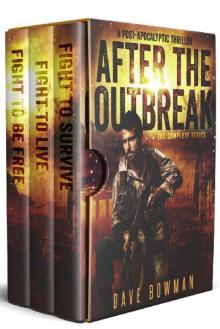 After the Outbreak- The Complete Series
After the Outbreak- The Complete Series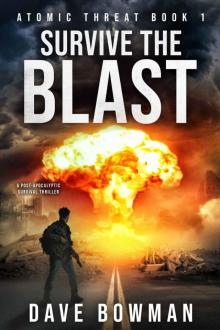 Survive the Blast
Survive the Blast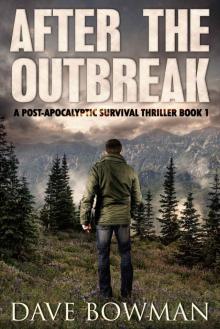 After the Outbreak (Book 1)
After the Outbreak (Book 1)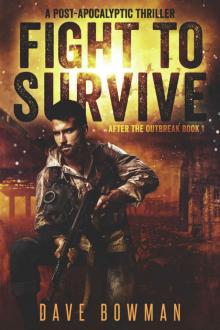 Fight to Survive: A Post-Apocalyptic Thriller (After the Outbreak Book 1)
Fight to Survive: A Post-Apocalyptic Thriller (After the Outbreak Book 1)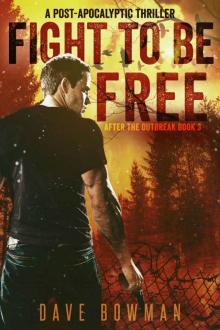 Fight to Be Free
Fight to Be Free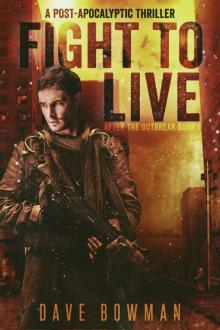 Fight to Live: A Post-Apocalyptic Thriller (After the Outbreak Book 2)
Fight to Live: A Post-Apocalyptic Thriller (After the Outbreak Book 2)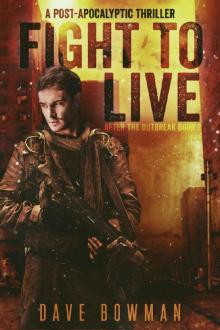 Fight to Live
Fight to Live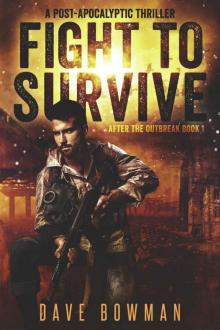 Fight to Survive
Fight to Survive